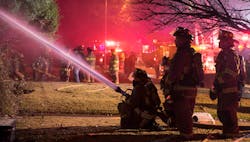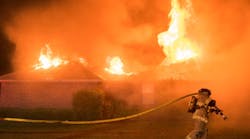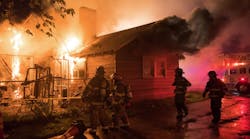In the first part of this three-part series, I wrote the following about the commandments of being an awesome firefighter.
In 2017 and beyond, as a firefighter, in order to be the best subordinate I can for my supervisor, the best follower for my leader, the best teammate for my co-workers, the best employee for the fire department and jurisdiction that took a chance on me by hiring me and who I have entered into an employment contract with (which is a two-way street—they pay you a fair wage and offer reasonable benefits and you have the right to go elsewhere if you feel you can get better somewhere else; in return you are expected to do your job to the best of your abilities and perform the required duties and responsibilities of the position), and most importantly, do what I can to ensure I go home safely at the end of my shift so that I can see my family and friends, and eventually have a long and healthy retirement, I promise to do the following in no specific order.
In April, I shared the first 25 commandments and in May another 25 commandments. This month we share the final 25 commandments in the commandments of being an awesome firefighter.
- Realize I don’t know everything, and that I need to continuously be learning more about the fire service and any type of situation we may be faced with on any given shift.
- Learn from history, so that we don’t allow history to repeat itself with another Line-Of-Duty-Death (LODD), injury, or significant event. Sadly though, I realize this is tough but I will do my best. I say it’s tough because you look at virtually any LODD after action report and it seems like we are continuing to allow history to repeat itself, over and over and over again. What will it take?
- Not expect my officer (my supervisor) to be my buddy, but to be my boss and do his or her job, which means keeping me out of trouble, keeping me safe, and keeping me on the right track, among other things.
- Support and live by the 16 Firefighter Life Safety Initiatives. (If you have no clue about what they are, or you can’t even name one of the 16, does that mean you don’t care about your brother and sister firefighters or yourself for that matter)? I encourage you to learn more at www.everyonegoeshome.com and see how well your fire department and your crewmembers do when it comes to meeting each and every one of those 16 Firefighter Life Safety Initiatives.
- Not give lip service to safety. While I know, this happens every day around the World, I will do what I can to practice what we are hopefully preaching.
- Be a proponent for fire prevention efforts such as ensuring and supporting the installation of smoke alarms and fire sprinklers in not just commercial structures, but residential structures as well. While some may feel this will reduce the number of fires and take away the fun of the job, I feel differently. I got into this career for a number of reasons; two being to help others and save lives. Well, if we truly care about the lives of others as well as our own lives, we will whole-heartedly embrace the concept of fire prevention. If more buildings were sprinklered, we would have less firefighter injuries and fatalities, not to mention less civilian injuries and fatalities, as well as less property damage. So I challenge those who dislike fire sprinklers: if you don’t like or support sprinklers, I guess that means you don’t care about firefighter safety or care about your brothers or sisters?
- Take fire prevention inspections seriously, and not just focus on the 3 E’s as some do: extinguishers, extension cords and exit pathways. Doing a quality fire prevention inspection on a facility is something that not only the customer will benefit from, but we the fire department will also benefit from. Yes, I understand we are all busy and we may have a large number of inspections to do and while it may be tempting to just check the box, call it in, or short cut the process – doing those items will mean everyone loses, including us. While I know we in the fire service want to be the good guys and good gals, when it comes to violations found on inspections, we can’t just be the nice person and not document or write them up. If we don’t hold them accountable, chances are they won’t either, and will just blow us off. Remember, we are there as advocates for those customers who enter a building, expecting it to be safe for them to enter. Don’t rely on your fire prevention inspection staff (assuming you have 40-hour personnel performing such duties) to do all this work. If anything, those serving at the fire stations are best suited for this activity because they are the end-users of the inspections, in addition to the property owners.
- Be a proponent for public education efforts. Public education is not just giving out stickers to the kids we meet. It is actually doing what we can to educate and inform, based on the current research and information that is available to us. Giving out stickers is public relations, which is a good thing, but it isn’t public education unless we ask them to answer a question related to fire safety to successfully receive the sticker.
- Make an effort to go out of my way to ensure we are performing the highest level of customer service we can. This includes smiling, taking the time to actually talk to those we serve, and explain what it is and why it is we are doing, when appropriate. This means not doing inappropriate things such as high-fiving or saying great job to another firefighter on the front lawn after we extinguish a fire at someone’s house while they and others are watching and grieving.
- Know the names and faces of our elected officials, our Mayor, our City Manager, and our Police Chief, just to name a few – so that when we encounter them in some form or fashion (we will, they even may drop by the fire station unannounced), I don’t embarrass my officer or the fire chief by not knowing who they are. I will show them the utmost respect, like I would any other human being. If I see one of those individuals and I don’t know them, I will take the time to introduce myself and say hi, letting them know we are here to serve the community to the best of our ability.
- Not be sucked into groupthink or peer pressure, as tough as it will be. This will be tough at times, but I am my own person and I can’t forget where I came from, nor can I be bullied or pressured into being someone I am not.
- Be honest, be ethical, and have integrity.
- Treat others as I would want to be treated, or as I would want my parents, significant other, or children treated.
- Treat our customers as if they were one of my loved ones, even if it was the fifth time that day we responded to their request for assistance via 9-1-1. I will remember the person requesting our assistance is never an inconvenience, as inconveniencing it may be for me or our crew.
- Prepare my family and friends for my being away for potentially extended periods of time. This means ensuring they can be self-sufficient if I am forced (or choose) to be at work for multiple days or weeks at a time.
- Drive an expensive vehicle to the firehouse and park it there, even if it behind a closed, secured gate that nobody can see. If I don’t drive an expensive vehicle (sports car, tricked out truck, etc.), than this doesn’t apply. If you have to ask what an expensive vehicle is, chances are if it has the words Porsche, Maserati, Rolls Royce, Tesla, Bentley, Cadillac, Mercedes Benz, Ferrari, etc. in it, then it is probably more than your average resident can afford. Before we go any further, realize I have seen ALL of those cars and SUVs in firehouse parking lots across the country. It happens regularly. If you do own one of those vehicles, it’s probably not in my best interest to put firefighter stickers, license plates, or anything else that may identify you as a firefighter. (Now you may think you have the right to drive whatever you want, and I’m not disagreeing. You do. The problem is when you’re wondering why you are not getting raises or getting any respect from your citizens, it doesn’t help your situation to have a Porsche parked in the back of the firehouse because it sends a message you’re already making more than you probably should be making. I realize that is just perception, and may not be anywhere close to the truth, but perception is reality. Don’t fuel the fire. If we were smart, we would all drive our “beater” cars and trucks to the station so people may feel sorry for us.
- Put Firefighter stickers or license plates on other vehicles in my household (spouse, children, etc.), without having given them “the speech.” Meaning they need to know that they are representing the entire fire service when they are behind the wheel and that the average person who sees them driving does not realize if they are or are not a firefighter. So if your spouse or child is breaking the law or being rude drivers (speeding, unsafe lane changes, telling others they are number one, not wearing their seat belt, talking on their cell phone while driving, texting while driving, not using turn signals, etc.), while they are driving their or your vehicle but with your firefighter stickers or license plates, they are making ALL of us look bad. They may not care, but you should if you care about and respect the fire service as a whole.
- Use my position to accept free goods (such as food) or accept discounts from business owners in our jurisdiction just because I am in a uniform or known to be a firefighter. I will politely thank them and let them know it is against our policy to accept such generosity. If they force it on me, and it appears refusing the discount will cause an embarrassing scene, I will ensure I pay the actual normal bill into the tip jar to at least let those watching know I’m not getting any preferential treatment and that I’m paying my way like everyone else.
- Use my position to get me out of trouble. If I am stopped and questioned by a law enforcement officer, I will not start out the conversation with something to the effect of “but I’m a Firefighter,” or “can you give me a break, I’m a Firefighter?” I will also not flash my badge, identification card or business card expecting professional courtesy. If they ask me if I am a Firefighter because they see a sticker or license plate advertising such, then I will answer their question yes. I also realize they may hold me to a higher standard just because I am or at least supposed to be a fire service professional.
- Not feel entitled about what the department, the community or anyone is supposed to give me. This may sound old school, but the world or anyone for that matter doesn’t owe me a thing. As the old saying goes, “it’s not what your Country can do for you, it’s what you can do for your Country!” To many, that may be old fashioned, but it definitely has merit in the year 2017.
- Say, “I didn’t know.” Instead, I will say something to the effect of “my bad,” I will do a better job next time. I will do my best to take responsibility and ownership for my actions and non-actions, and hold myself accountable when needed.
- Follow through on what I say I will do. If I promise to do something, I will do it and do it well and on time. If I tell someone I will get them something, I will do so. If I am unable to do so, I will let them know such and let them know when I think I will be able to follow through with their request.
- Check my department email on a regular basis (at least once a day), and actually respond to items that I am expected to respond to, even if I think it would be easiest to hit delete, hoping it will go away.
- Do what I can to attend at least one fire service conference a year, such as Firehouse World in San Diego or Firehouse Expo in Nashville. If I am unable to attend such conferences, I will attempt to at least attend local or state conferences that may be closer to home and easier and cheaper to get to.
- Last, but not least, remember to always be nice. Nice to those I work with, those I work for, and those that I come in contact with at all times. As a retired Firefighter used to tell others, and me “it doesn’t cost anything to be nice!”
I challenge each and every firefighter to take the abovementioned items to heart and start walking the walk, not just talking the talk. Doing so will ensure they are not only being the best personnel they can be (in my opinion), but also the best representatives the fire service and their respective fire departments could ever ask for. As a human being and a taxpayer, these 75 items should not be unrealistic or asking too much of anyone who considers themselves to be a firefighter – regardless of whether you are an explorer, cadet, reserve, auxiliary, volunteer, part-time paid, or career firefighter and regardless of the type of fire department you work for (city, county, state, federal, district, industrial, private, etc.).
- See Steve Live! Steve Prziborowski will be presenting "10 More Commandments of a Great Company Officer" and "The Top Six Survival Skills for Today's Fire Officer" at Firehouse Expo, Oct. 17-21, in Nashville.








